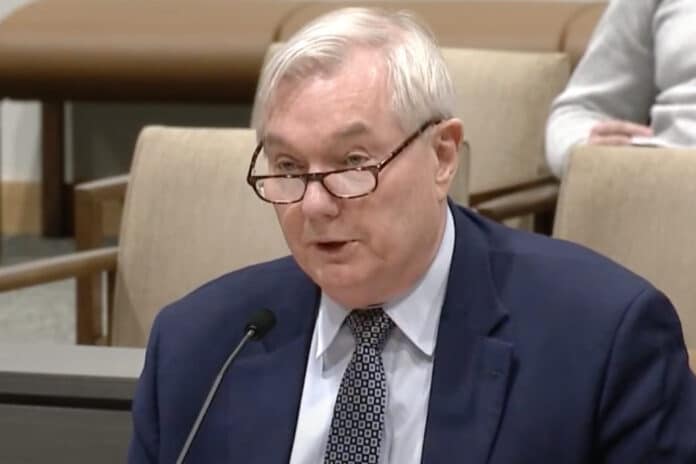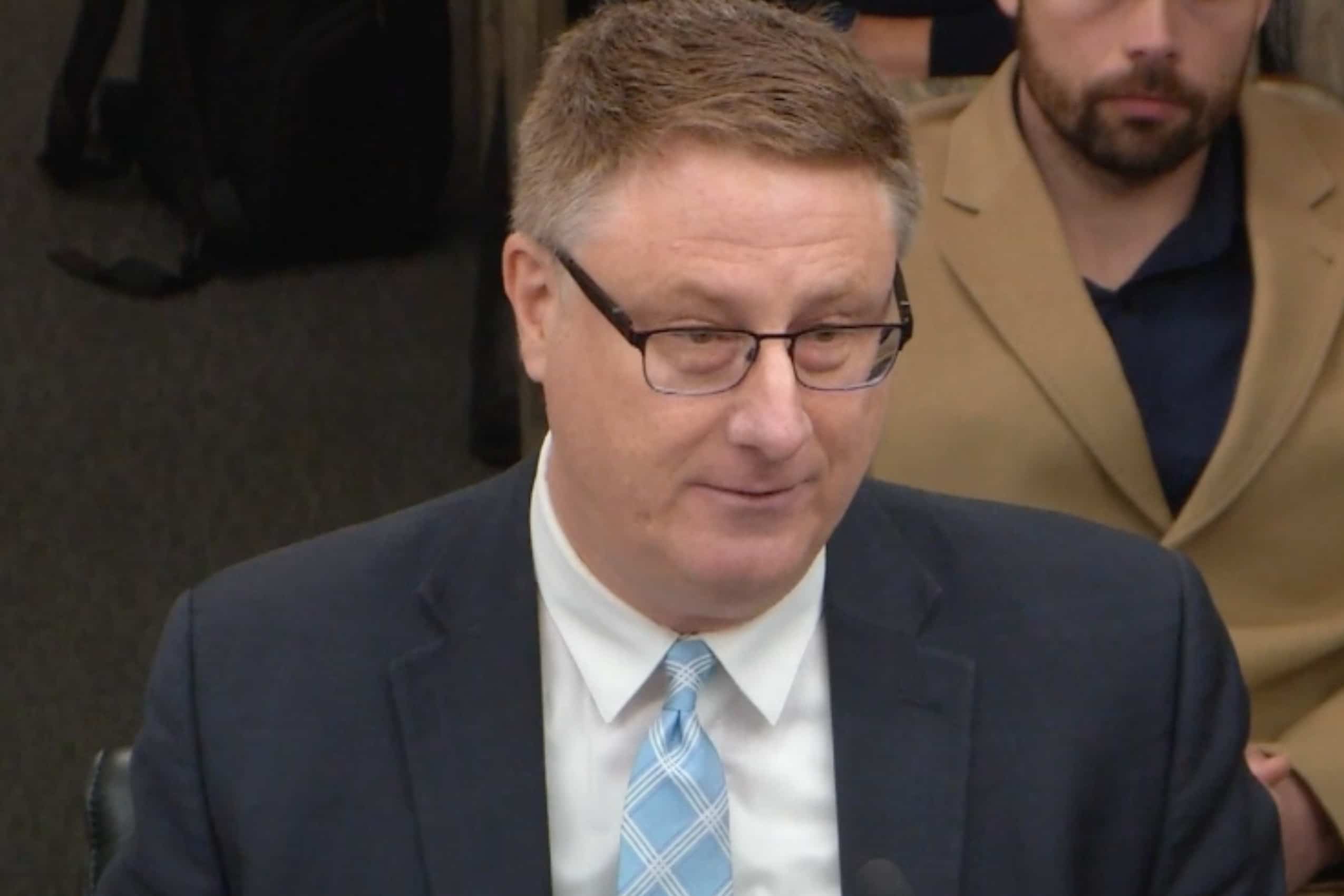
Dr. Mike Osterholm, a University of Minnesota infectious disease expert, is perhaps best known for his opinions on the COVID-19 pandemic.
But the longtime director of the university’s Center for Infectious Disease Research and Policy (CIDRAP) shared with legislators this week that he would prefer to be remembered for his efforts to turn Minnesota into a ranked-choice voting (RCV) state.
Osterholm serves on the board of directors for FairVote Minnesota, a well-funded non-profit organization that’s focused almost solely on making Minnesota the third state in the nation to implement RCV statewide.
“While I have been fortunate to experience significant success in my life, I view RCV as the legacy of my lifetime,” Osterholm wrote to legislators holding a hearing on HF3276 on Tuesday. The bill would give local governments the power to implement ranked-choice voting by a simple majority vote of their elected members.
Currently, only municipalities that are self-governed by charter can implement RCV, and that must be done by a voter-approved ballot referendum.
Just 107 of the state’s 853 cities are “home-rule charter” cities. The others are considered statutory municipalities, and in order for those local governments (and others like counties and school districts) to change their voting system, they would have to approve it locally and then petition the legislature to grant the change to RCV as a method for electing their local representation.
A pair of DFL lawmakers, who fell short last year of gaining enough support in the legislature to turn Minnesota into a ranked-choice voting state, have scaled back their efforts to more incremental steps, which Osterholm says he supports.
“As a nationally-recognized public health expert, I have had the opportunity to observe the successes and failures of our nation’s response to numerous health crises, including the pandemic,” Osterholm wrote in his testimony supporting the bill. “And what I discovered is that many of our public health failures arose from deficiencies in governance and our polarized political environment … While no single reform can solve all the dysfunction in our government, RCV is a proven, common sense step we can take right now.”
On Tuesday, members of the House State and Local Government Finance and Policy Committee voted along party lines to advance the bill. It has one more stop before its expected to go before the House floor. Several members of FairVote Minnesota showed up at the hearing in their bright orange t-shirts signifying their support for the legislation.
Others disagree with Osterholm’s view, including those who work at the same university at which he is employed.
A 2023 study of ranked-choice voting published by two scholars at the U of M’s Humphrey School of Public Affairs concluded that there is “little evidence” to support claims by some RCV proponents that the system stems the tide of political polarization.
“A particularly sophisticated analysis found that RCV actually increased animosity among Democrats and Republicans compared to our current system,” said the report, co-authored by political scientist and Humphrey school faculty member Larry Jacobs.
Testifiers at the April 9 committee hearing on HF3276 mentioned that study in their criticism of the legislation, along with a 2015 opinion piece authored by the late DFL politician Walter Mondale opposing ranked-choice voting.
“What you are hearing (from RCV proponents) is that it increases voting opportunities for minorities,” said David Clark of Bloomington, who has led efforts to oppose RCV in his city. “It actually disenfranchises minorities because their votes are thrown out or spoiled at a much higher rate than other groups,” Clark continued, citing a study published in January by the Center for Election Confidence.
But the author of the bill, Rep. Cedrick Frazier, DFL-New Hope, disputes those findings. He said his bill is “about local control and authorized no mandates.”

“Ranked-choice voting — it’s to give you options, you have a choice,” Frazier said during the April 9 hearing. “If you decide to not rank those (candidates) and you only rank one and that is the person you choose, I don’t think it is dilution. You are just choosing to only rank one individual.”
He successfully added an amendment that featured technical changes to the bill that gained the support of the League of Minnesota Cities and Association of Minnesota Counties.
Secretary of State Steve Simon continues to testify in support of the local RCV bill. Last year, he disappointed a number of RCV advocates when he testified in opposition to a bill that would have implemented ranked-choice voting for all legislative offices and statewide offices.
“[Ranked-choice voting] is not for everyone,” Simon said in the Tuesday hearing. “And support for this bill is not dependent on someone liking ranked-choice voting, or being convinced on its merits. Many people on this committee are convinced, and some are not and are skeptical, and that’s okay. This is about local choice and local autonomy. And leveling the playing field and allowing those cities to adopt it if they wish, and nothing is permanent. If they don’t like it, they can always get rid of it.”
What is RCV? Who is funding the effort in Minnesota?
Ranked-choice voting allows voters to pick multiple candidates for an office and rank them in the order of their preference (first choice, second choice, third choice, etc.). If any candidate wins a majority of first choice votes, he or she is declared the winner. If not, then the election goes to subsequent rounds, with the lowest vote-getter’s totals in each round being redistributed to the second, third or fourth choices of voters who picked them first.
The ranked-choice voting movement in Minnesota has been pushed for the last several years by FairVote Minnesota, a local chapter of the national FairVote organization.
FairVote Minnesota raised more than $1.6 million in 2022 for campaigning and outreach activities to promote RCV. Its executive compensation expenses have more than tripled over the last five years, according to public tax filings. The organization paid its executive director, Jeanne Massey, more than $226,000 in 2022.
Massey is active on social media in sharing the endorsements RCV has received from dozens of DFL legislators and statewide and federal elected officials, including Gov. Tim Walz, Sen. Tina Smith and Congressman Dean Phillips.
The organization has been heavily funded by donors from outside the state of Minnesota, who have helped bankroll expensive campaigns to approve RCV ballot referenda in charter-governed cities like Minnetonka, St. Louis Park and Bloomington. In 2015, FairVote Minnesota and an allied organization spent $181,000 to drum up support for an RCV measure.
Some of FairVote Minnesota’s prominent donors include Kathryn Murdoch, daughter-in-law to media mogul Rupert Murdoch, and Texas billionaire John Arnold, who donated almost $2 million in recent years to the Minnesota group.
Hank Long
Hank Long is a journalism and communications professional whose writing career includes coverage of the Minnesota legislature, city and county governments and the commercial real estate industry. Hank received his undergraduate degree at the University of Minnesota, where he studied journalism, and his law degree at the University of St. Thomas. The Minnesota native lives in the Twin Cities with his wife and four children. His dream is to be around when the Vikings win the Super Bowl.















